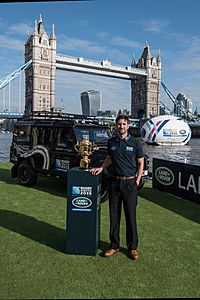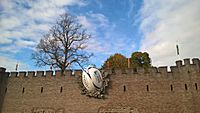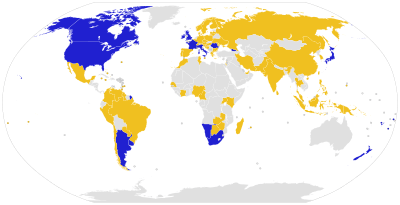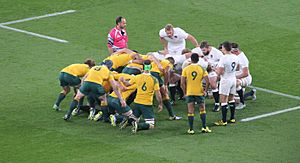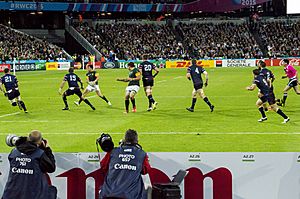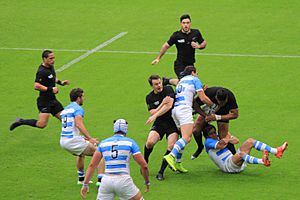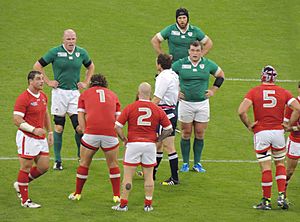2015 Rugby World Cup facts for kids
 |
|
| Tournament details | |
|---|---|
| Host nation | |
| Dates | 18 September – 31 October (44 days) |
| No. of nations | 20 (96 qualifying) |
| Final positions | |
| Champions |
{{Country data | flaglink/core | variant = | size = | name = | altlink = national rugby union team | altvar = rugby union}} |
| Runner-up |
{{Country data | flaglink/core | variant = | size = | name = | altlink = national rugby union team | altvar = rugby union}} |
| Third place |
{{Country data | flaglink/core | variant = | size = | name = | altlink = national rugby union team | altvar = rugby union}} |
| Tournament statistics | |
| Matches played | 48 |
| Attendance | 2,477,805 (51,621 per match) |
The 2015 Rugby World Cup was a huge international rugby tournament. It happens every four years. England hosted this exciting event from September 18 to October 31. Twenty countries competed. Only one team was new from the 2011 World Cup: Uruguay joined, replacing Russia. This was the first time no brand-new teams played in the tournament.
The All Blacks were the champions. They won against Australia 34–17 in the final match. South Africa came in third place, beating Argentina. This World Cup was special because no team from the Northern Hemisphere made it past the quarter-finals. New Zealand also made history. They were the first team to win the title twice in a row. They also won the World Cup for the third time ever.
One of the most surprising games was between Japan and South Africa. Japan scored a winning try right at the end. Many people called it the biggest upset in rugby history. The host team, England, was knocked out early. They lost to Wales and Australia. This was the first time the host nation didn't reach the knockout stage.
Contents
Choosing the Host Country
The International Rugby Board (IRB) asked countries to show interest in hosting the 2015 or 2019 tournaments. A record 10 countries wanted to host. These included Australia, England, Ireland, Italy, Jamaica, Japan, Russia, Scotland, South Africa, and Wales.
Many countries later decided not to bid. Jamaica was the first to withdraw. Russia focused on another rugby event. Australia and Ireland pulled out due to money reasons. Scotland couldn't find partners to help host. Wales also withdrew but supported England's bid. Some games were even played in Wales at the Millennium Stadium.
Final Bids for Hosting
Four countries made final bids to host the 2015 Rugby World Cup. These were England, Japan, South Africa, and Italy. This was the most bids ever for the Rugby World Cup.
On July 28, 2009, the IRB announced the winners. England would host the 2015 World Cup. Japan would host the 2019 event. The decision was made after a vote.
England's Bid
England decided to bid for the World Cup in 2007. They hoped the 2015 World Cup would be part of Britain's "Decade of Sport." This decade included other big events like the 2012 Summer Olympics.
England's bid was strong because it promised to make a lot of money. The IRB wanted to make sure the tournament was profitable. England planned to sell 3 million tickets. They expected to generate £300 million for the IRB. This included money from TV rights and sponsorships.
Italy's Bid
Italy also wanted to host the World Cup. Their slogan was "For the Enlargement of the Frontiers of Our Sport." This meant they wanted to help rugby grow in new places. The 2007 World Cup was the first hosted by a non-English-speaking country.
Italy offered its largest cities and stadiums. They also promised a fast train system. Rugby had become more popular in Italy. This was especially true since they joined the Six Nations in 2000. The Stadio Olimpico in Rome was suggested for the final. Other big cities like Milan and Naples were also included. Even Stade Vélodrome in Marseille, France, was considered.
Japan's Bid
Japan officially submitted its bid in May 2009. Japan was a strong contender. They had almost won the bid for the 2011 event. Japan had a lot to offer for rugby's growth in Asia. It has a large population and a big economy. Hosting would bring rugby to a new audience.
Rugby was already popular in Japan. They had many registered players. Japan's Top League showed off their rugby talent. Japan also had experience hosting big events. They co-hosted the 2002 FIFA World Cup. This meant they already had the stadiums and facilities needed.
South Africa's Bid
South Africa also wanted to host the 2015 tournament. They had tried to host the 2011 World Cup but didn't win. South Africa had many strengths. It is in the same time zone as Europe, which is a big TV market for rugby. South Africa had won the 2007 Rugby World Cup. They had also successfully hosted the 1995 Rugby World Cup. They were also building new stadiums for the 2010 FIFA World Cup.
Where the Games Were Played
After England was chosen as the host, the stadiums were announced. The final list of venues was confirmed on May 2, 2013. Twelve stadiums were in England. One stadium, the Millennium Stadium, was in neighboring Wales. The IRB allowed the Welsh stadium because it was large and well-located.
Of the thirteen venues, some were rugby-specific stadiums. Others were national rugby stadiums. Two were multi-purpose stadiums, like Wembley Stadium. The rest were football grounds. Some proposed venues, like the Stadium of Light in Sunderland, were not chosen. Old Trafford was also withdrawn. Instead, Manchester City's stadium was used for one match.
| Wembley Stadium | Twickenham | Olympic Stadium | Millennium Stadium | ||
| Capacity: 90,000 | Capacity: 82,000 | Capacity: 56,000 | Capacity: 74,154 | ||
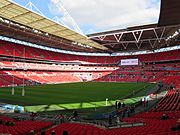 |
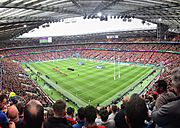 |
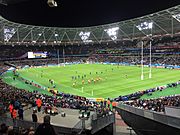 |
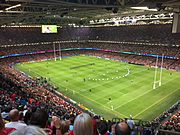 |
||
| St James' Park | City of Manchester Stadium | ||||
| Capacity: 52,409 | Capacity: 55,097 | ||||
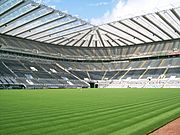 |
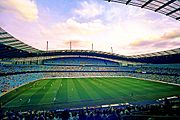 |
||||
| Villa Park | Elland Road | ||||
| Capacity: 42,785 | Capacity: 37,914 | ||||
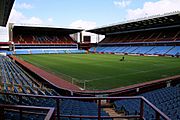 |
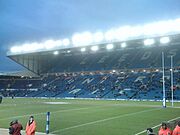 |
||||
| Leicester City Stadium | Brighton Community Stadium | Stadium MK | Kingsholm Stadium | Sandy Park | |
| Capacity: 32,312 | Capacity: 30,750 | Capacity: 30,717 | Capacity: 16,500 | Capacity: 12,300 | |
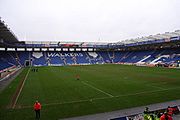 |
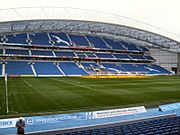 |
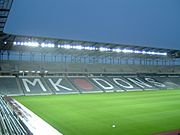 |
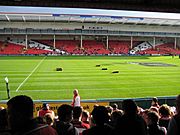 |
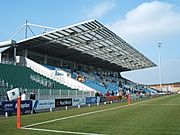 |
|
Source: The Telegraph
Team Training Bases
The teams stayed and trained at 41 different locations. These "team bases" were announced in August 2014. Each base had outdoor and indoor training areas. They also had a swimming pool, gym, and hotel. Teams used these places before and during the World Cup.
How Teams Qualified
Out of the 20 teams in the 2015 World Cup, 12 had already qualified. They did this by finishing in the top three of their groups in the 2011 Rugby World Cup. The other eight teams earned their spots through regional competitions. As the host nation, England automatically qualified.
Teams That Played
Twenty teams played in the final tournament. Here are the regions they came from:
|
|
|
How the Teams Were Grouped
Teams were put into groups (pools) based on their World Rugby Rankings. The draw happened on December 3, 2012, in London. The top 12 teams from the 2011 World Cup were placed into three main groups. The other 8 qualifying spots were then added to two more groups.
This meant the 20 teams were sorted like this:
| Pot 1 | Pot 2 | Pot 3 | Pot 4 | Pot 5 |
|---|---|---|---|---|
|
|
|
|
|
The draw was done by picking balls from pots. The first ball went to Pool A, the second to Pool B, and so on. Famous rugby players and important people helped with the draw.
Criticism of the Draw
Some people criticized when the draw happened. It was done three years before the tournament started. This meant that by the time the games began, some groups were much tougher than others. For example, Pool A had three of the top-ranked teams: Australia, England, and Wales.
After England was knocked out, Wales coach Warren Gatland said it was "ridiculous" that the draw was done so early. He felt sorry for the teams affected. World Rugby later agreed to consider making the draw closer to the tournament for future events.
Team Rosters
Each country could have a team of 31 players for the tournament. These lists had to be given to World Rugby by August 31, 2015. If a player got injured, they could be replaced. However, the injured player could not return to the team later. Also, a new player had to wait 48 hours before playing in a game.
Opening Ceremony
The 2015 Rugby World Cup started with an opening ceremony. It took place at Twickenham Stadium in London on September 18, 2015. The ceremony told the story of how rugby began. It featured a choir singing "Swing Low, Sweet Chariot," a famous rugby song.
A former player represented each team. Martin Johnson, who won the World Cup with England, represented the host nation. Prince Harry, Duke of Sussex, helped open the tournament. He ended his speech by saying, "We're ready. Game on."
Group Stage Matches
The first part of the tournament was the group stage. The 20 teams were split into four groups, with five teams in each. This was the same setup as the 2003, 2007, and 2011 World Cups. Each team played every other team in its group once.
Teams earned points for their games:
- Four points for a win.
- Two points for a draw.
- No points for a loss.
- A bonus point if they scored four or more tries in a match.
- A bonus point if they lost by fewer than eight points.
The top two teams from each group moved on to the quarter-finals. The top three teams from each group also automatically qualified for the 2019 Rugby World Cup. Japan already qualified as the host for 2019.
| Pool A | Pool B | Pool C | Pool D |
|---|---|---|---|
|
|
|
|
- What if Teams Had the Same Points?
If two or more teams had the same number of points, these rules decided who went through:
- The winner of the match between those two teams.
- The difference between points scored and points given up in all group matches.
- The difference between tries scored and tries given up in all group matches.
- Total points scored in all group matches.
- Total tries scored in all group matches.
- Their official World Rugby Rankings.
| Key to colours in pool tables | |
|---|---|
| Advanced to the quarter-finals and qualified for the 2019 Rugby World Cup | |
| Eliminated but qualified for 2019 Rugby World Cup | |
Pool A Matches
|
Team
|
Pld | W | D | L | TF | PF | PA | +/− | BP | Pts |
|---|---|---|---|---|---|---|---|---|---|---|
| 4 | 4 | 0 | 0 | 17 | 141 | 35 | +106 | 1 | 17 | |
| 4 | 3 | 0 | 1 | 11 | 111 | 62 | +49 | 1 | 13 | |
| 4 | 2 | 0 | 2 | 16 | 133 | 75 | +58 | 3 | 11 | |
| 4 | 1 | 0 | 3 | 10 | 84 | 101 | –17 | 1 | 5 | |
| 4 | 0 | 0 | 4 | 2 | 30 | 226 | –196 | 0 | 0 |
Pool B Matches
|
Team
|
Pld | W | D | L | TF | PF | PA | +/− | BP | Pts |
|---|---|---|---|---|---|---|---|---|---|---|
| 4 | 3 | 0 | 1 | 23 | 176 | 56 | +120 | 4 | 16 | |
| 4 | 3 | 0 | 1 | 14 | 136 | 93 | +43 | 2 | 14 | |
| 4 | 3 | 0 | 1 | 9 | 98 | 100 | –2 | 0 | 12 | |
| 4 | 1 | 0 | 3 | 7 | 69 | 124 | –55 | 2 | 6 | |
| 4 | 0 | 0 | 4 | 5 | 50 | 156 | –106 | 0 | 0 |
Pool C Matches
|
Team
|
Pld | W | D | L | TF | PF | PA | +/− | BP | Pts |
|---|---|---|---|---|---|---|---|---|---|---|
| 4 | 4 | 0 | 0 | 25 | 174 | 49 | +125 | 3 | 19 | |
| 4 | 3 | 0 | 1 | 22 | 179 | 70 | +109 | 3 | 15 | |
| 4 | 2 | 0 | 2 | 5 | 53 | 123 | –70 | 0 | 8 | |
| 4 | 1 | 0 | 3 | 8 | 70 | 130 | –60 | 2 | 6 | |
| 4 | 0 | 0 | 4 | 8 | 70 | 174 | –104 | 1 | 1 |
Pool D Matches
|
Team
|
Pld | W | D | L | TF | PF | PA | +/− | BP | Pts |
|---|---|---|---|---|---|---|---|---|---|---|
| 4 | 4 | 0 | 0 | 16 | 134 | 35 | +99 | 2 | 18 | |
| 4 | 3 | 0 | 1 | 12 | 120 | 63 | +57 | 2 | 14 | |
| 4 | 2 | 0 | 2 | 7 | 74 | 88 | –14 | 2 | 10 | |
| 4 | 1 | 0 | 3 | 7 | 60 | 129 | –69 | 0 | 4 | |
| 4 | 0 | 0 | 4 | 7 | 58 | 131 | –73 | 2 | 2 |
Knockout Stage: The Finals Begin!
After the group stage, the tournament moved to the knockout rounds. This meant if a team lost, they were out!
| Quarter-finals | Semi-finals | Final | ||||||||
| 17 October – London (Twickenham) | ||||||||||
| |
23 | |||||||||
| 24 October – London (Twickenham) | ||||||||||
| |
19 | |||||||||
| |
18 | |||||||||
| 17 October – Cardiff | ||||||||||
| |
20 | |||||||||
| |
62 | |||||||||
| 31 October – London (Twickenham) | ||||||||||
| |
13 | |||||||||
| |
34 | |||||||||
| 18 October – Cardiff | ||||||||||
| |
17
|
|||||||||
| |
20 | |||||||||
| 25 October – London (Twickenham) | ||||||||||
| |
43 | |||||||||
| |
15 | |||||||||
| 18 October – London (Twickenham) | ||||||||||
| |
29
|
|||||||||
| |
35 | |||||||||
| |
34
|
|||||||||
Quarter-finals: The Top 8 Teams
The quarter-finals were the first knockout matches.
| 17 October 2015 16:00 BST (UTC+01) |
South Africa |
23–19 | Twickenham Stadium, London Attendance: 79,572 Referee: Wayne Barnes (England) |
|
|---|---|---|---|---|
| Try: Du Preez 75' m Pen: Pollard (5/7) 9', 13', 17', 21', 62' Drop: Pollard 52' |
Report | Try: G. Davies 18' c Con: Biggar (1/1) 19' Pen: Biggar (3/4) 15', 47', 64' Drop: Biggar 40' |
| 17 October 2015 20:00 BST (UTC+01) |
New Zealand |
62–13 | Millennium Stadium, Cardiff Attendance: 71,619 Referee: Nigel Owens (Wales) |
|
|---|---|---|---|---|
| Try: Retallick 11' c Milner-Skudder 23' c Savea (3) 29' c, 38' m, 59' c Kaino 50' m Read 64' c Kerr-Barlow (2) 68' c, 71' c Con: Carter (7/9) 12', 25', 31', 60', 65', 68', 72' Pen: Carter (1/1) 7' |
Report | Try: Picamoles 36' c Con: Parra (1/1) 37' Pen: Spedding (1/1) 9' Parra (1/2) 15' |
| 18 October 2015 13:00 BST (UTC+01) |
Ireland |
20–43 | Millennium Stadium, Cardiff Attendance: 72,316 Referee: Jérôme Garcès (France) |
|
|---|---|---|---|---|
| Try: Fitzgerald 26' c Murphy 44' c Con: Madigan (2/2) 27', 45' Pen: Madigan (2/4) 20', 53' |
Report | Try: Moroni 3' c Imhoff (2) 10' c, 73' c Tuculet 69' c Con: Sánchez (4/4) 5', 10', 70', 74' Pen: Sánchez (5/6) 13', 22', 51', 64', 77' |
| 18 October 2015 16:00 BST (UTC+01) |
Australia |
35–34 | Twickenham Stadium, London Attendance: 77,110 Referee: Craig Joubert (South Africa) |
|
|---|---|---|---|---|
| Try: Ashley-Cooper 9' m Mitchell (2) 30' m, 43' c Hooper 40' m Kuridrani 64' c Con: Foley (2/5) 44', 65' Pen: Foley (2/2) 54', 80' |
Report | Try: Horne 18' c Seymour 59' m Bennett 74' c Con: Laidlaw (2/3) 19', 75' Pen: Laidlaw (5/5) 14', 21', 34', 47', 69' |
Semi-finals: The Final Four
Only four teams remained to battle for a spot in the final.
| 24 October 2015 16:00 BST (UTC+01) |
South Africa |
18–20 | Twickenham Stadium, London Attendance: 80,090 Referee: Jérôme Garcès (France) |
|
|---|---|---|---|---|
| Pen: Pollard (5/5) 3', 11', 21', 39', 58' Lambie (1/1) 69' |
Report | Try: Kaino 6' c Barrett 52' c Con: Carter (2/2) 9', 53' Pen: Carter (1/2) 60' Drop: Carter 46' |
| 25 October 2015 16:00 GMT (UTC+00) |
Argentina |
15–29 | Twickenham Stadium, London Attendance: 80,025 Referee: Wayne Barnes (England) |
|
|---|---|---|---|---|
| Pen: Sánchez (5/5) 7', 24', 36', 45', 55' |
Report | Try: Simmons 2' c Ashley-Cooper (3) 10' c, 32' m, 72' c Con: Foley (3/4) 3', 11', 73' Pen: Foley (1/2) 48' |
Bronze Final: Third Place Match
The teams that lost in the semi-finals played for third place.
| 30 October 2015 20:00 GMT (UTC+00) |
South Africa |
24–13 | Olympic Stadium, London Attendance: 55,925 Referee: John Lacey (Ireland) |
|
|---|---|---|---|---|
| Try: Pietersen 6' c Etzebeth 43' m Con: Pollard (1/2) 7' Pen: Pollard (4/5) 14', 33', 40', 48' |
Report | Try: Orlandi 80' c Con: Sánchez (1/1) 80' Pen: Sánchez (1/1) 52' Drop: Sánchez 42' |
The Grand Final
The two best teams faced off in the final match to decide the champion.
| 31 October 2015 16:00 GMT (UTC+00) |
New Zealand |
34–17 | Twickenham Stadium, London Attendance: 80,125 Referee: Nigel Owens (Wales) |
|
|---|---|---|---|---|
| Try: Milner-Skudder 39' c Nonu 42' m Barrett 79' c Con: Carter (2/3) 40', 80' Pen: Carter (4/4) 8', 27', 36', 75' Drop: Carter 70' |
Report | Try: Pocock 53' c Kuridrani 64' c Con: Foley (2/2) 54', 65' Pen: Foley (1/1) 14' |
Awards and Top Players
At the 2015 World Rugby Awards, Japan's winning try against South Africa was named the best moment. A "dream team" was also chosen. This team included the best players from the tournament.
2015 Rugby World Cup Dream Team
|
|
Tournament Statistics
| Player | Team | Points |
|---|---|---|
| Nicolás Sánchez | 97 | |
| Handré Pollard | 93 | |
| Bernard Foley | 82 | |
| Dan Carter | 82 | |
| Greig Laidlaw | 79 |
The player who scored the most points was Nicolás Sánchez from Argentina. He scored 97 points. Julian Savea from New Zealand scored the most tries, with eight. This tied the record for most tries in one tournament. The record was previously held by Jonah Lomu and Bryan Habana.
Video Game
An official video game for the tournament was released. It was called Rugby World Cup 2015. It came out on September 4, 2015, for various gaming systems. However, the game received very low ratings from critics.
Tickets
Ticket prices were announced in November 2013. General ticket sales started in September 2014. Adult tickets for group matches began at £15. Children's tickets were available from £7 for many games. Tickets for the final match cost between £150 and £715.
See also
 In Spanish: Copa Mundial de Rugby de 2015 para niños
In Spanish: Copa Mundial de Rugby de 2015 para niños


